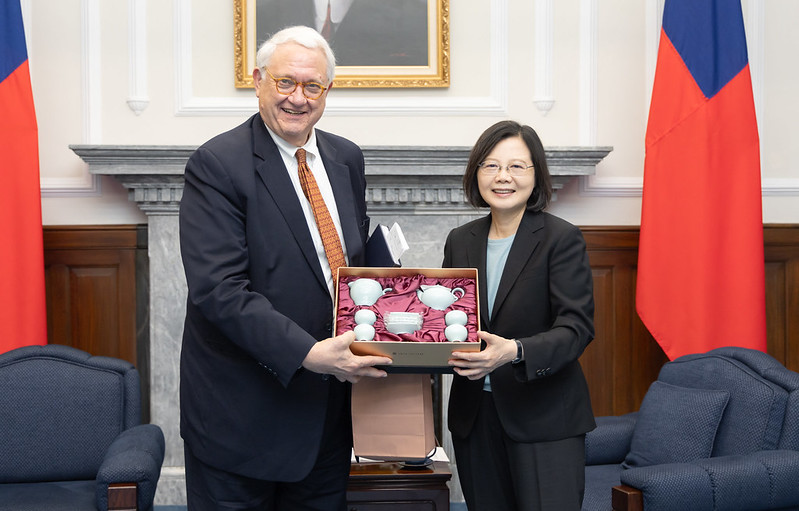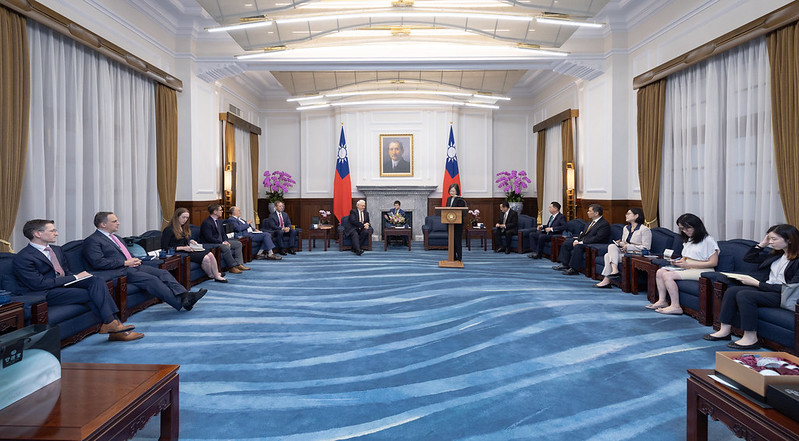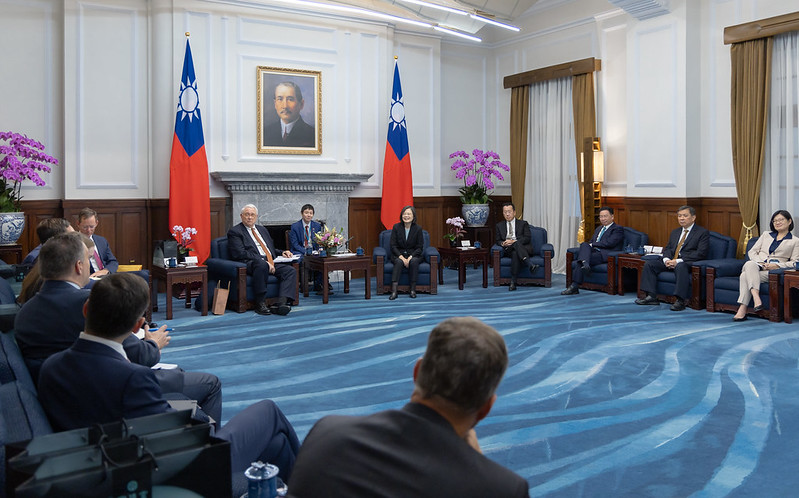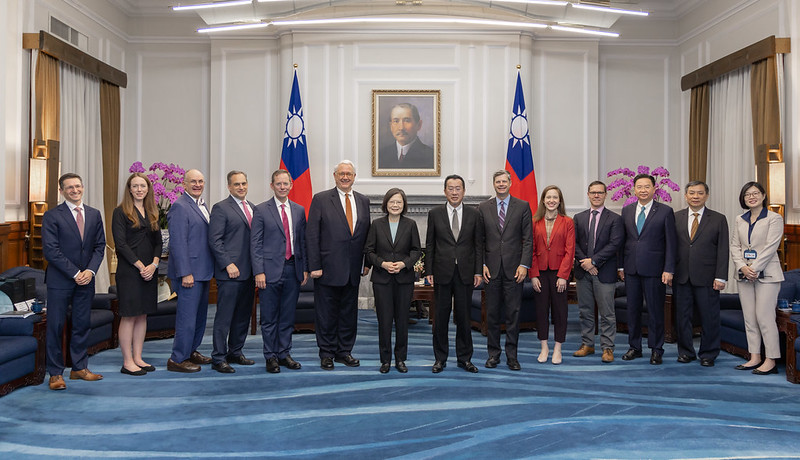News & activities
 News releases
News releases
On the afternoon of September 4, President Tsai Ing-wen met with a delegation from the Center for Strategic and International Studies (CSIS). In remarks, President Tsai said that enhancing global democratic resilience and safeguarding peace and stability in the Indo-Pacific region have become common objectives for Taiwan and the United States. The president pointed out that our bilateral relationship has continued to grow stronger in recent years thanks to the efforts of our governments as well as people-to-people exchanges. She thanked CSIS for long focusing on cross-strait and Taiwan-related issues and for helping promote Taiwan-US cooperation, and expressed confidence that on this visit the members of the delegation will gain further insight into the latest developments across the Taiwan Strait and will continue to use their influence in Washington, DC to further promote our shared goals.
A translation of President Tsai's remarks follows:
I welcome you all to the Presidential Office. Since beginning my term of office in 2016, I have had many opportunities to engage with CSIS members both at international events and here at the Presidential Office. I am delighted to see CSIS President and CEO John Hamre and Freeman Chair in China Studies Jude Blanchette once again. And our other guests today former US Deputy Assistant Secretary of State for China and Taiwan Rick Waters and Senior Fellow at the American Enterprise Institute Zack Cooper are also good friends who know Taiwan very well.
President Hamre last led a delegation to the Presidential Office five years ago. At that time, we exchanged opinions about the international landscape. Over the past five years, there have been fundamental changes to international security. Since the outbreak of the Russia-Ukraine war, authoritarianism has continued to expand and the rules-based international order has faced unprecedented challenges. Enhancing global democratic resilience and safeguarding peace and stability in the Indo-Pacific have become common objectives for Taiwan and the United States.
CSIS is one of the world's most influential think tanks and its analyses of the international landscape are highly regarded across the globe. I am sure that this visit will give you further insight into the latest developments across the Taiwan Strait and that you will continue to use your influence in Washington, DC to further promote our shared goals.
Economic security is national security. Taiwan and the United States are important trade partners and we continue to deepen our collaboration. In June, the first agreement under the Taiwan-US Initiative on 21st-Century Trade was signed, setting a milestone in our bilateral economic relations. Our Legislative Yuan and the US Congress have also demonstrated their support for this agreement through concrete actions. Going forward, we hope to use this solid foundation to swiftly conclude follow-up negotiations. We also look forward to signing an avoidance of double taxation agreement to resolve issues faced by individuals and businesses in both Taiwan and the United States and foster even closer industrial cooperation between our nations.
In recent years, the Taiwan-US relationship has continued to grow stronger thanks to the efforts of our governments and to the key contributions of people-to-people exchanges. I would like to thank all of you for long focusing on cross-strait and Taiwan-related issues and for helping promote Taiwan-US exchanges and cooperation. I wish you all a pleasant and productive trip. And I look forward to exchanging opinions with you on the development of Taiwan-US relations and the regional landscape.
President Hamre then delivered remarks, thanking President Tsai for making time to meet with his delegation and remarking on her confidence as a leader and her intellectual openness.
Noting that he last met with President Tsai five years ago but that they had met virtually since then, President Hamre recalled that in their virtual meeting, President Tsai mentioned her priority to sign a free trade agreement with the United States. President Hamre said that he initially did not think it would be possible to do so within the tenure of a term-limited president, but that President Tsai is making it happen. He then congratulated President Tsai on this achievement.
President Hamre mentioned that President Tsai has faced many challenges these last five years, during which we have witnessed rising aggression in Beijing and a war in Ukraine that has strained everything around us, while following US Speaker of the House Nancy Pelosi's visit to Taiwan, China conducted military exercises. Noting that President Tsai has had a lot of challenges during her term, he expressed his admiration for her handling of these challenges with dignity, calmness, and determination.
President Hamre stated that earlier he and his delegation discussed the economic challenges that China is having with officials from the Ministry of Foreign Affairs and other government agencies, and expressed his belief that this development will present a challenge. But, he said, his delegation is confident in President Tsai's leadership. He then stated that the US wants a partner in Taiwan that is thoughtful, prudent, and careful, and a partnership in which we value each other's interests and we maintain continuous dialogue. The US, he said, looks forward to that continuing for many years to come.
The delegation also included Arleigh A. Burke Chair in Strategy at CSIS Eliot Cohen, Senior Fellow and Director of the Energy, Economics, and Security Program at the Center for a New American Security Emily Kilcrease, and Senior Vice President, Harold Brown Chair, Director of the International Security Program, and Director of the Transnational Threats Project at CSIS Seth Jones.












